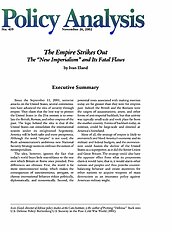The idea, however, ignores the fact that today’s world bears little resemblance to the one over which Britain or Rome once presided. Two differences are obvious: First, the world is far more interconnected today, which makes the consequences of sanctimonious, arrogant, or clumsy international behavior riskier politically, diplomatically, and economically. Second, the potential costs associated with making enemies today are far greater than they were for empires past. Indeed, the British and the Romans were the targets of assassinations, arson, and other forms of anti-imperial backlash, but that activity was typically small-scale and took place far from the mother country. Forms of backlash today, in contrast, could be large-scale and directed at America’s homeland.
Most of all, the strategy of empire is likely to overstretch and bleed America’s economy and its military and federal budgets, and the overextension could hasten the decline of the United States as a superpower, as it did the Soviet Union and Great Britain. The strategy could also have the opposite effect from what its proponents claim it would have; that is, it would alarm other nations and peoples and thus provoke counter-balancing behavior and create incentives for other nations to acquire weapons of mass destruction as an insurance policy against American military might.


